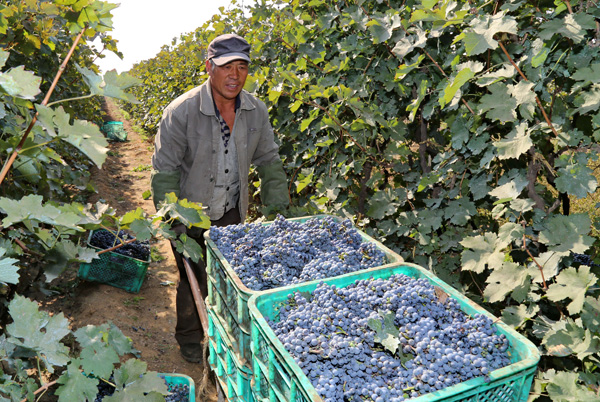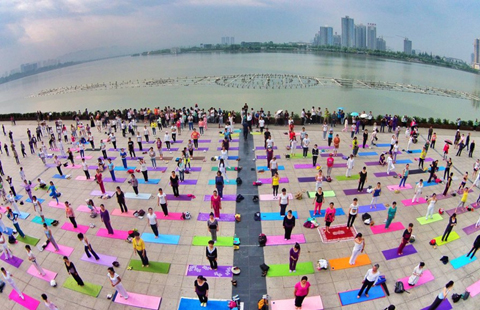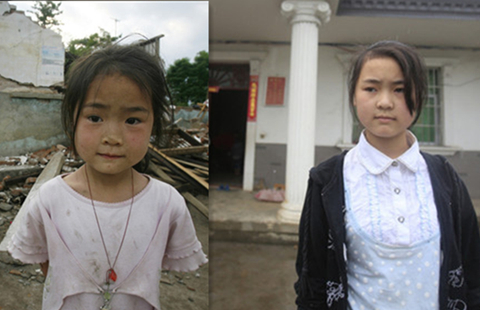The grapes of China: Nation's wine consumption, industry booming
Updated: 2015-05-07 06:19
By William Hennelly(China Daily USA)
|
||||||||
 |
|
A grape-picker pushes a cart loaded with grapes at a vineyard in Changli county, Hebei province, in October 2014. Photo / XINHUA |
When China focuses on a particular market, it tends to do so in a big way.
"It's the largest consumer of red wine," Jean-Marie Aurand, director general of the International Organization of Vine (OIV) and Wines, said at a press conference in Paris on April 27. "A large part of the population has reached a standard of living that allows them access to wine."

China now has the second-largest number of acres devoted to vineyards in the world, nearly 2 million acres, the OIV said. It recently passed France, the legendary producer of Beaujolais, Bordeaux and Champagne, although not all of China's grapes go to winemaking.
Since 2000, China's wine consumption has increased 45 percent.
Joe Chuang owns the Firefly Vineyard in Napa, California — the unofficial wine capital of the United States — where he produces premium wines for export to China. He is also chairman of Flower Valley Winery (FVW) in Huailai county, Hebei province, near Beijing.
"Young Chinese consumers are far more exposed to foreign cultures than their parents, via touring, attending schools abroad, watching foreign movies (in theater or on the Internet), and frequent contacts with foreigners in China," Chuang wrote to China Daily in an e-mail. "Drinking wines is viewed by them as a fashion or a way of life in modern society."
Chuang is also the founder of the nonprofit Cal-China Wine Culture Exchange (CCWCE), which will hold the first Cal-China Wine Forum on June 5 in Sacramento, California.
"Grape-wine production is a relatively young industry in China," said Chuang, who is originally from Taiwan and whose wife is from Beijing. "Over the last 10 years, I see constant wine-quality improvement, and it will continue to improve. Due to the collaboration with foreign wine producers, primarily the French so far, some wines are considered 'premium'.
"For example, Petit Mansng and Marselan, both French varietals grown in Huailai county, are
two fine wines to be featured and tasted by attendees at the forum in Sacramento," he said.
Chuang said that rice wines, "a small portion of the wine market in China, will continue to be the wines preferred by many consumers (age 40 and above) to pair with their cuisines, primarily in the east coast region".
He said that grape vines were imported by the Han Dynasty 3,000 years ago from central Asia and Persia. "Intrinsic grapes, primarily in the northeast region, are called 'mountain grapes', low in sugar and high in acid, not suitable for wine production.
"Taking weather and soil into consideration, Hebei province, including the nearby Beijing
area, is ideal for growing grape vines due to the relatively dry, hot sun from June to September, and good soil," he said. "This is probably why the French Agricultural Ministry established its China experimental vineyard in Huailai county 15 years ago."
While China is a leading exporter of many products around the world, that's not the case with wine.
"Similar to the US, China's domestic consumption is greater than its own production, and (there is) no need to export at this stage," Chuang said. "Based on our own experience of selling California wines in China, Chinese consumers will prefer wines from California
if the import duty is lowered."
Chuang's winery in Huailai county produces California-style wine "to demonstrate the quality of viticulture and winemaking technologies from the US", he said. "Also, FVW can help California wineries promote their wines in China."
Chuang said that much of the vineyard acreage in China is for table grapes, not wine. Among the five major wine-producing regions, "only certain regions, in my opinion, are suitable for growing premium grapes due to the weather and soil constraints".
A delegation from Huailai Valley will attend the June 5 forum. They are: Zhu Qunde, deputy county governor of Huailai; Shi Jianmin, vice-chairman of the Peoples' Political Consultative Committee of Huailai; Tan Jidong, office director of the Huailai government; and Zin Ruibao, director of the Huailai County Forestry Department. Six winery executives from Huailai also will make the trip.
Chuang said the CCWCE "would like the US wine producers to have the opportunity of direct contacts with wine producers from major regions in China, to taste the Chinese wines to know what style of wines are preferred by the Chinese consumers, and to establish direct contact and channels for their wine export, if desirable".
And of course, there will be visits to some of those enticing California wineries.
"For the Chinese delegation, we will show them the high-quality wine education and research in California, touring the wineries in Napa and Sonoma, and experiencing the wine culture
in California to help promote the tourism," Chuang said.
Contact the writer at williamhennelly@chinadailyusa.com

 China and Russia hold naval exercise
China and Russia hold naval exercise
 Ten photos you don't wanna miss - May 12
Ten photos you don't wanna miss - May 12
 Students demonstrate new official anti-smoking gestures
Students demonstrate new official anti-smoking gestures
 Wenchuan earthquake: Seven years on
Wenchuan earthquake: Seven years on
 Ten photos you don't wanna miss - May 11
Ten photos you don't wanna miss - May 11
 Man successfully flies homemade plane
Man successfully flies homemade plane
 Beautiful images capture amazing Tibet
Beautiful images capture amazing Tibet
 Russian daredevils scale Ping An building
Russian daredevils scale Ping An building
Most Viewed
Editor's Picks

|

|

|

|

|

|
Today's Top News
Kerry off to China ahead of key talks
Volvo picks South Carolina for plant
Anti-graft body stresses inspections at lower levels
Ex-official on 'most wanted' list is arrested
China, Belarus to boost relations at local level
French president calls for end to US embargo on Cuba
Cook says Apple in talks with Alibaba over Apple Pay in China
China urges Pentagon to 'rationally' view military strength
US Weekly

|

|







